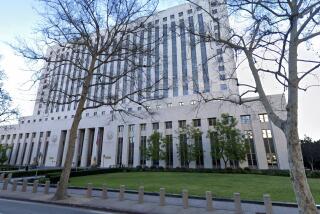State Coastal Panel Rejects Mini-Mall : Development: Commissioners cite the controversial project’s lack of environmental clearances and legal entanglements. : VENICE
The California Coastal Commission has rejected a controversial mini-mall proposed for the Venice Boardwalk, saying that its complicated legal problems with the city of Los Angeles should be resolved before the commission considers the project.
At its monthly meeting Thursday, the commission voted 6 to 5 not to issue permits for the 21,269-square-foot project proposed by developer Stephen Blanchard.
“I think it should be held until somebody gets it together,” said Commissioner Mark Nathanson, voting with the majority.
Blanchard is seeking permits to build a three-story building containing offices, shops and 12 fast-food restaurants, some of which would serve alcohol, at 601 Ocean Front Walk.
From the outset, some neighbors have vehemently opposed the project, saying that it would overwhelm the area with noise, congestion and other problems. The developer argues that the Boardwalk is a perfect spot for the project, which would serve the throngs of visitors who come to Venice Beach.
Controversy was heightened last year when Blanchard successfully invoked a little-used state law requiring cities to act on development proposals in a timely manner. As a result, the project received city approval without having obtained environmental clearance.
The issue took on overt political tones Thursday with an appearance by City Council candidate Mary Lee Gray, who testified against the project. Gray is seeking to unseat incumbent Ruth Galanter in a June 4 runoff election in the 6th Council District, which includes Venice.
Developer Blanchard angrily accused Gray of using him and his project “for her own aggrandizement” to win votes. In turn, she charged him with trying to intimidate her into not appearing before the commission.
Meanwhile, Venice resident Steve Schlein, an opponent of the mini-mall, and his attorney, Barry A. Fisher, criticized Galanter for not attending the meeting or sending a written statement to the commissioners. “She should be here,” Fisher said. “She should be at their (the neighbors’) side.”
But Galanter’s press secretary, Rick Ruiz, said the city attorney’s office had advised Galanter to stay out of the fray because of pending litigation with the city.
Galanter had previously taken a position generally in favor of the project, with the stipulation that details would be ironed out in the environmental review process and at public hearings--hearings that never took place because Blanchard invoked the state Permit Streamlining Act.
The developer and the North Venice Beach Coalition have lawsuits pending with the city because of the extraordinary circumstances surrounding the project.
The absence of a city environmental review, however, posed a problem for the Coastal Commission, because it normally relies on a local government’s environmental data to help it decide if a project should be approved.
Commissioners said the combination of missing environmental information and the complexity of the legal dispute persuaded them that the project should not be approved now. The developer can reapply later after coming to terms with the city of Los Angeles.
Blanchard’s attorney, Sherman Stacey, argued that Blanchard should not be held hostage because the city had botched the approval process. Outside the hearing, he said that the opponents had perverted the process by filing voluminous objections to the project in an effort to delay it, leaving him no choice but to invoke the streamlining law.
Stacey acknowledged that legal obstacles would have remained had the commission approved the project Thursday, but he said the approval would have greatly strengthened his client’s hand in dealing with the city.
Blanchard first proposed the project in 1986, then applied for city permits in 1988. “I can’t tell you how disappointed I am,” he said after the vote.
Though the Los Angeles city attorney has said Blanchard should get his city approval because of their mistake, subsequent intervention by another city agency clouded the issue yet again.
This happened when project opponents appealed the decision to the Board of Zoning Appeals. The board in October, 1990, ruled that the public hearing process had wrongly been eliminated and said the project required environmental clearance before permits should be issued.
It fell to the city zoning administrator’s office to try to resolve the conflicting decisions, but the zoning officials have decided not to take action pending resolution of the legal issues.
Outside the hearing room Thursday, tempers flared as the longtime antagonists hurled accusations and insults at each other. In calmer moments, project opponent John Stein concluded that the fray is a classic battle between money and people, while Blanchard vowed to fight on to get his project approved.
More to Read
Sign up for Essential California
The most important California stories and recommendations in your inbox every morning.
You may occasionally receive promotional content from the Los Angeles Times.






